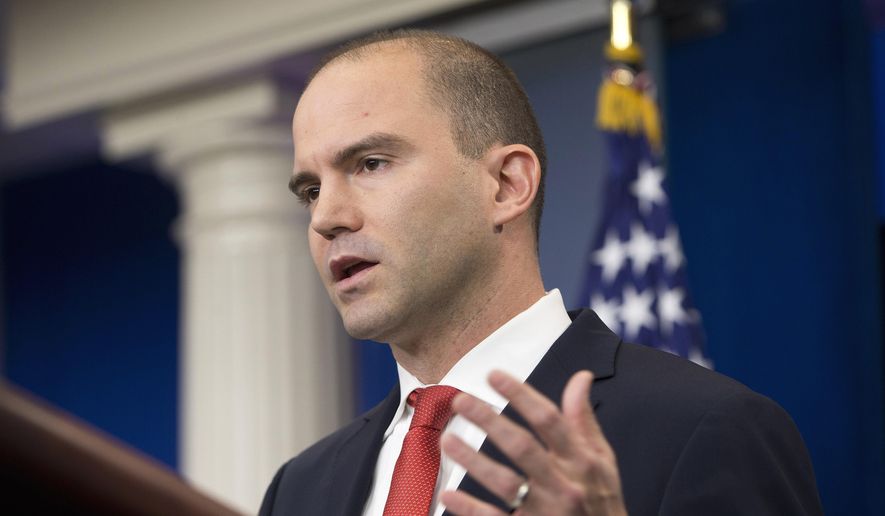OPINION:
It is now historic fact that reporters in Washington, D.C., were lied to and fooled by the Obama Administration with regard to the Iran nuclear deal. We know this because the architect of the fiction that was woven for the benefit of these eager young journalists has openly bragged about it.
Ben Rhodes, the man who majored in creative writing and then ended up the Deputy National Security Adviser for President Obama, told The New York Times about the “echo chamber” he was able to create and feed:
In the spring of last year, legions of arms-control experts began popping up at think tanks and on social media, and then became key sources for hundreds of often-clueless reporters. ’We created an echo chamber,’ [Rhodes] admitted, when I asked him to explain the onslaught of freshly minted experts cheerleading for the deal. ’They were saying things that validated what we had given them to say.’
“The average reporter we talk to is 27 years old, and their only reporting experience consists of being around political campaigns. … They literally know nothing,” Rhodes bragged.
And the know-nothing millennials loved him for it. And, apparently, they still do.
This week, Politico reporter Josh Meyer broke a stunning investigative report detailing how the Obama Administration spiked a Drug Enforcement Agency investigation into a multibillion dollar drug and weapons ring that funded Hezbollah, the terrorist group created by, funded by and working in tandem with the Iranian government.
According to Meyer’s report, the investigation was halted so as not to disrupt the negotiations for the nuclear deal. Apparently, the Iranian government indicated that pressure on Hezbollah would not be welcome and no nuclear deal would have reflected poorly on the Obama legacy.
Clearly, the Obama legacy was more important than stopping a terrorist group. After all, Osama bin Laden was dead and GM was alive … or something.
So where has the media echo chamber gone? Normally, a thorough and solid bit of reporting like this would get picked up by various news outlets across multiple mediums. The reporter would be interviewed on various cable networks and the topic would be central to various panels of pundits and experts debating and arguing over the validity of the report and the political ramifications for the individuals and parties involved.
Just look at how the “echo chamber” worked after The Washington Post’s blockbuster investigation of Alabama Senate candidate Roy Moore’s dating habits in the ’70s.
But, not this time. And not with this story.
In fact, Rhodes has ramped up his “echo chamber” and gotten the old band back together for a bit of a reunion tour. He and his cohorts have taken to Twitter for an embarrassing and deceitful character assassination of Meyer. But the Politico reporter has stood his ground.
In a series of tweets Thursday afternoon, Meyer responded to the attacks:
That’s the thing @Tvietor08 your echo chamber keeps saying my @politico piece is wrong but offer zero specifics. I’m gonna take the high road and not respond further until you do. Meantime, happy holidays y’all. Btw, don’t you supporters of Iran Deal also have “an obvious POV”? https://t.co/suI1dxnr2G
— Josh Meyer (@JoshMeyerDC) December 21, 2017
Meyer also made himself available to multiple television journalists for interviews and in-depth coverage of the story. You could almost see the tumbleweeds rolling down the middle of the Blue-Check Journo Avenue in response to his offer.
In fact, when CNN’s Jake Tapper was called out for not defending Meyer while he was facing the Rhodes onslaught, Tapper responded and praised the Politico reporter and his work.
And you don’t pose as a brave anything, anonymous person.
— Jake Tapper (@jaketapper) December 21, 2017
Not sure Josh needs my help, he seems to be handling himself just fine defending his fascinating report.
Congrats on the scoop, Josh. Don’t let the partisans get you down.
Meyer then graciously responded and made himself available to Tapper for his program.
Happy to discuss my @politico stry on TV, especially given the orchestrated smear campaign, which STILL hasn’t contested a single fact in it https://t.co/0tgoGhpwWu
— Josh Meyer (@JoshMeyerDC) December 21, 2017
And it ended there.
Knowing Tapper, there was probably a flurry of direct messages traded between the CNN host and Meyer, so for all we know the story might be topic 1 on today’s “The Lead” on CNN. But, a cursory search of CNN.com for the term “Hezbollah” turns up absolutely nothing on the Obama/DEA.Iran deal story since Politico ran it early this week.
The Echo Chamber lives, and Ben Rhodes is smiling. Legacy intact.




Please read our comment policy before commenting.